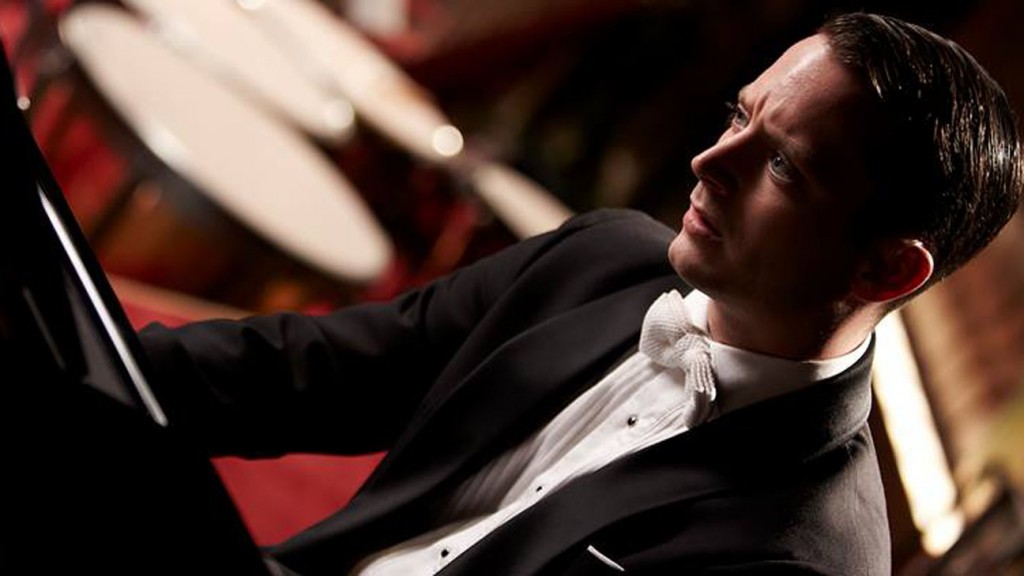Gives “Stage Fright” a whole new meaning.
The H-Bomb: Classical pianist Paul Selznick (Elijah Wood) choked during a concert five years ago, and he hasn’t performed on stage since. He never had any intention of ever returning to the stage; however, his mentor recently passed away, and Paul has been tapped to play at a benefit concert being held in his honor. Since this is his first live gig in ages, Paul is understandably nervous, especially since he will be performing a near impossible piece, the same one he goofed up on so many years ago.
As if the pressure of returning to the stage for such an important venue wasn’t enough to wrack Paul’s nerves, what he discovers when he opens his sheet music is. Written in his music, in a bold marker, are the words, “Play one wrong note and you’re dead!” Soon after, Paul finds an ear piece, and when he puts it in, a voice that sounds suspiciously like John Cusack’s assures him that the threat is no joke. He warns Paul that there is a sniper rifle aimed at his head, and that if he hits a single wrong note, or if he tries to signal help from anyone, he’s a dead man.
Not that Paul needed any more convincing, but just to drive the point home, our shady Cusack soundalike fires a silenced round into the stage floor. The voice also informs Paul that if he screws up, not only will he kill him, he’ll kill Paul’s movie star wife, Emma (Kerry Bishe), who is in attendance, as well. Paul truly seems to have no choice but to pull his shit together and give the performance of his life. But why is this whacko so hell bent on killing him if he hits a wrong note? Is he merely an over zealous music connoisseur, or could he possibly have some ulterior motive?
Essentially, this slick, intense thriller is Phone Booth with a piano. In fact, I’d be willing to bet that was how the project was sold to its potential investors. While that description is indeed accurate, it really is selling the film short, because Grand Piano is, in my always humble opinion, a far superior film to Phone Booth. And I liked Phone Booth, I think it’s one of Joel Schumacher’s better films, for whatever that’s worth. But I digress…
Director Eugenio Mira utilizes the elegant concert hall setting to its full potential with some impressively stylish cinematography, giving the film the kind of visual gusto that recalls Alfred Hitchcock at the height of his cinematic powers. Actually, it’s more reminiscent of Brian De Palma when he tries to ape Hitchcock, but either way, the Master was most definitely on the filmmakers’ minds as they shot Grand Piano, which is certainly not a bad thing.
Mira also learned a thing or two from old Hitch when it came to building suspense. Through the editing and the camera work, he ratchets up the tension to a fever pitch. It’s a slow burn, for sure, but one that puts us right in Paul’s mortified shoes, and it’s only at the end of the film’s slight seventy-something minutes, that we get a release. Mira’s execution of Damien Chazelle’s tight and economical script is nearly flawless, as he has crafted a thriller more potent than anything De Palma has been able to muster in decades. I haven’t seen any of this director’s prior work, but I will be keeping an eye out for him in the future.
The technical aspects aside, the main component that keeps the tension relentlessly high is Wood’s performance. He’s an actor I never really gave a damn about in the past, but that started to change with his better than expected turn in the Maniac remake. Now, I’m convinced he may very well be worth a damn, after all. Wood makes us empathize with Paul. He makes us feel his stage fright, his terror at having a gun aimed at his head, and he makes us root for him, when he finally grows some nuts at the end and fights back. As for Cusack, who gives a mostly vocal performance, he is just plain chilling. Something about his deadpan voice is quite unnerving. This is the third time in the past year or so that I’ve seen Cusack get his creep on, and his work here is easily the creepiest.
Though I would like to call Grand Piano a perfect thriller, I simply cannot, because, as highly entertaining as it is, there are flaws I cannot overlook. The ultimate climax is rather quick and disappointingly routine. The antagonist’s ultimate motivation, which drives the mystery to an extent, turns out to be less than compelling. The story, when all is said and done, is not terribly original, and the plot could have used more complications. Overall, it’s not a particularly significant film, nor will it be all that memorable. However, while it played, I found Grand Piano to be a superbly taut little sleeper that is very much worth seeking out.




